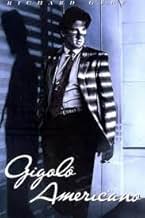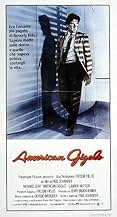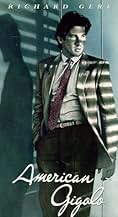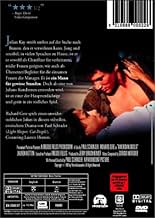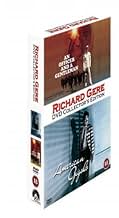IMDb-BEWERTUNG
6,3/10
31.326
IHRE BEWERTUNG
Einem auf ältere Damen spezialisierten Callboy aus Los Angeles wird ein Mord vorgeworfen, den er nicht begangen hat.Einem auf ältere Damen spezialisierten Callboy aus Los Angeles wird ein Mord vorgeworfen, den er nicht begangen hat.Einem auf ältere Damen spezialisierten Callboy aus Los Angeles wird ein Mord vorgeworfen, den er nicht begangen hat.
- Auszeichnungen
- 2 Nominierungen insgesamt
Nina van Pallandt
- Anne
- (as Nina Van Pallandt)
Patricia Carr
- Judy Rheiman
- (as Patti Carr)
Macdonald Carey
- Hollywood Actor
- (as MacDonald Carey)
Empfohlene Bewertungen
This is one of Richard Gere's first lead roles in Hollywood, and he doesn't disappoint. The film gives a little insight, a preview even, of the seamier side of the 1980's. Beginning with the shots of Julian Kaye's (Gere) Mercedes convertible, glimpses of Rodeo Drives and Malibu (all with Blondie screaming "Call Me"!), the film manages to be more than just a whodunit. Perhaps the charm of the film for me is that we're never quite sure what to think of Kaye and his married lover (Lauren Hutton), but their quest for happiness with each other is believable. And though the detective plot-line of the movie is a little contrived, Detective Sunday and Leon provide good opposite poles of this Sodom and Gommarah-like portrayal of life in L.A. In fact, Julian's verbal sparring with Detective Sunday provide a light contrast with the realistic portrayal of a gigolo on the run.
Okay-ish thriller-drama. Plot setup was good but it just seems to drift from a point. Ending is a bit trite and quite predictable. Surprising, as the movie is written-directed by Paul Schrader, who wrote Taxi Driver and Raging Bull for Martin Scorsese. Maybe he shouldn't direct... (though Affliction was great and Cat People was decent).
Performances are OK. This was Richard Gere's breakthrough role.
Performances are OK. This was Richard Gere's breakthrough role.
Giorgio Moroder's signature synths followed by Deborah Harry's instantly recognisable new wave classic, Call Me, opens up American Gigolo as we see a pretty suave 80s Richard Gere in a black Cadilliac driving along the beachside. Gere has all the trappings of a wealthy 80s lifestyle so usually romanticised in a Bruckheimer production but the film establishes in its first few scenes that Gere is pretty much a buck for hire with little sway over his Aryan madam. This form of bait and switch appears throughout the movie, with Gere appearing in control and pretty cool at first and then as a total whore. The dichotomy between these two personas plays a big part of the film's plot as Julian K., Gere, becomes entangled in a murder investigation of a trick who is the wife to a wealthy S&M aficionado and learns that he should question the many friendships he's procured during his career as a loverboy. Lauren Hutton plays a random woman that Gere meets and develops into the film's love interest after one of the most minimalist sex scenes in an 80s film. The set production, music, acting and story is all very connotative of the eighties. Apartments are gray or salmon coloured with minimalist artwork and expensive vases and silver blocky stereo systems - it's clear with some scenes, including one where Gere hangs upside down to do some crunches, that the set design heavily influenced the mise-en-scene of Mary Harron's adaptation of American Psycho. Moroder's various compositions of Blondie's Call Me highlight the continuing descent of Julian k. as the chorus becomes more melancholic and ominous - it's all very suspenseful from an eighties perspective. Some may find the final scenes slightly ridiculous and most likely unrealistic, but one should remember that American Gigolo was produced by Jerry Bruckheimer and even on the tail end of New Hollywood, the film does show caution in its dark themes as not to alienate mainstream audiences. I definitely felt the material was pretty subdued for a film written and directed by Taxi Driver's Paul Schrader. However, it doesn't matter as the film is effective as a time capsule of the seedier side of the eighties.
It's hard to precisely depict the impact of the smoky undertow of 1980s LA mores on the emotional and cultural landscape of the city, but Richard Gere's subversive topsy-turvy solo show comes close. Weird, well-shot and intriguing. The queasy feeling it leaves is hard to remove even days later. A/A-
It's important that Paul Schrader put 'American' in his title. This isn't just something to make it a title that is easily recognizable or to know what country it's from. It's about an American state of being, what it is to be a gigolo who likes swanky suits and fast cars and, well, the women he gets what he has to work for. But what happens when this man's reputation is called into question, or what kind of reputation a gigolo has? Politics also comes into it, not too oddly enough, as Julian (Richard Gere) catches the eye of a woman who is married to a Senator. That the movie is technically a murder mystery, sort of, as Julian is accused of killing a woman who he had seen previously as a 'fetish' customer, is almost besides the point. It is good for the plot, but what Julian has to focus on, the big question for him, is what is he doing with himself? How do other people look at him?
He makes himself a sex symbol, of sorts, as he works out religiously and always gets the best clothes (like a peacock perhaps). Schrader puts a lot of focus on the relationship Julian has with Michelle, who genuinely cares about him and is probably the only person he knows who is straight with him (certainly not the pimp played by Bill Duke, or his mentor who has her own gaggle of men and women to 'send out'). Of course sexuality plays into it, but I liked the fact that Schrader didn't focus squarely on it. He's interested in some of the mechanics of it (there's a scene where Julian/Michele do it, but it's shot much in the way of Godard's A Married Woman, lots of single shots of body parts, some flesh, but selective eroticism), and then, mostly, the consequences.
But, again, the look of the film should be an indicator. This is Los Angeles of 1979/1980, but it portends the future decade not just in the city but in the kind of middle-upper (or just upper) class lifestyle of expensive restaurants, good drinks, good clothes, and sometimes good women (or just lonely older women). Schrader even has a way of looking ahead to the future with Giorgio Moroder's score, which takes Blondie's "Call Me" and turns it into a synth score full of dread and mystery and drama. On top of how the look, its stylish exteriors and careful lighting (the Bruckheimer look before Tony Scott took it over with smoke machines), and the depth of the script, Gere is also fantastic here. He was on a roll right after Days of Heaven, and here he lights up the screen with charisma, pathos, intensity, and a sense of where to take the scenes where they need to be.
He, much like the environment around him, makes up what is the backdrop for a tale of morality in high society, hypocrisy where it may lay in the highs and lows, and what it means to fall in love. The only part it doesn't fully work is as a full-fledged thriller (again, the murder-mystery element is the weakest link), but everything else sparks the screen with interest and excitement.
He makes himself a sex symbol, of sorts, as he works out religiously and always gets the best clothes (like a peacock perhaps). Schrader puts a lot of focus on the relationship Julian has with Michelle, who genuinely cares about him and is probably the only person he knows who is straight with him (certainly not the pimp played by Bill Duke, or his mentor who has her own gaggle of men and women to 'send out'). Of course sexuality plays into it, but I liked the fact that Schrader didn't focus squarely on it. He's interested in some of the mechanics of it (there's a scene where Julian/Michele do it, but it's shot much in the way of Godard's A Married Woman, lots of single shots of body parts, some flesh, but selective eroticism), and then, mostly, the consequences.
But, again, the look of the film should be an indicator. This is Los Angeles of 1979/1980, but it portends the future decade not just in the city but in the kind of middle-upper (or just upper) class lifestyle of expensive restaurants, good drinks, good clothes, and sometimes good women (or just lonely older women). Schrader even has a way of looking ahead to the future with Giorgio Moroder's score, which takes Blondie's "Call Me" and turns it into a synth score full of dread and mystery and drama. On top of how the look, its stylish exteriors and careful lighting (the Bruckheimer look before Tony Scott took it over with smoke machines), and the depth of the script, Gere is also fantastic here. He was on a roll right after Days of Heaven, and here he lights up the screen with charisma, pathos, intensity, and a sense of where to take the scenes where they need to be.
He, much like the environment around him, makes up what is the backdrop for a tale of morality in high society, hypocrisy where it may lay in the highs and lows, and what it means to fall in love. The only part it doesn't fully work is as a full-fledged thriller (again, the murder-mystery element is the weakest link), but everything else sparks the screen with interest and excitement.
Wusstest du schon
- WissenswertesDebbie Harry has said the film's main title song "Call Me" was inspired by driving and she visualized the film's opening sequence when writing it. She said: "When I was writing it, I pictured the opening scene [of the movie], driving on the coast of California." Harry was first given an instrumental rough track titled "Man Machine" by Giorgio Moroder and was asked to write the melody and lyrics for the song. Reportedly, this only took her a few hours to do.
- PatzerHelicopter carrying the camera is clearly reflected just above the right rear wheel of the Mercedes.
- Zitate
Julian Kaye: Why me? Why did you pick me?
Leon: Because you were framable. You've stepped on too many toes. Nobody ever cared about you. I never even liked you much myself.
- Alternative VersionenABC edited 21 minutes from this film for its 1983 network television premiere.
- SoundtracksThe Love I Saw in You Is Just a Mirage
by Smokey Robinson (as W. Robinson) and Marvin Tarplin (as M. Tarplin)
Performed by Smokey Robinson & The Miracles (as Smokey Robinson and The Miracles)
Courtesy of Motown Records
Top-Auswahl
Melde dich zum Bewerten an und greife auf die Watchlist für personalisierte Empfehlungen zu.
Details
- Erscheinungsdatum
- Herkunftsland
- Offizieller Standort
- Sprachen
- Auch bekannt als
- Gigoló americano
- Drehorte
- Sunset Plaza Apartments - 1220 Sunset Plaza Drive, Mt. Olympus, Hollywood Hills, Los Angeles, Kalifornien, USA(Westwood Apartment Hotel, demolished 1987 and replaced by a totally different building - see GE at the actual address)
- Produktionsfirmen
- Weitere beteiligte Unternehmen bei IMDbPro anzeigen
Box Office
- Budget
- 4.800.000 $ (geschätzt)
- Bruttoertrag in den USA und Kanada
- 22.743.674 $
- Eröffnungswochenende in den USA und in Kanada
- 3.559.930 $
- 3. Feb. 1980
- Weltweiter Bruttoertrag
- 22.745.134 $
Zu dieser Seite beitragen
Bearbeitung vorschlagen oder fehlenden Inhalt hinzufügen


